Although visually impaired, 15-year-old Sam Doman has at least one advantage over other deer hunters: he can sometimes smell a herd before others can see it.
“Their musk glands can smell pretty strong,” he explained.
Despite being able to perceive only light, Sam likely goes hunting as often as any other student in his class.
Using a special riflescope, he and his father, Randy Doman, have worked out a system allowing them to hunt in tandem. Sitting closely behind Sam, Randy is able to see through the scope without pressing his own eye socket against it. To target the quarry, he either tells Sam where to aim the firearm or adjusts his shoulders.
Sam squeezes the trigger.
“We’ve done it countless times and it’s been successful,” said Sam, noting that participating in these annual fall rites means a lot to him. “There are tons of kids who go hunting. It’s a great thing to be able to talk about it, just like everyone else.”
For the Doman family, hunting and fishing are longstanding traditions. Randy wanted to pass those traditions on to his son. Until recently, it didn’t seem possible for someone with Sam’s disability to fire a rifle. But that’s changing as more adaptive equipment like Sam’s special scope comes to market.
Adaptive Gear Can Make Dreams Come True
Sam got an early start in life pursuing his passion. But for Patty Hayne, achieving her dream came later.
Now 63, Patty was 14 months old when she fell into a fire pit. Her burns were so severe that surgeons amputated her right hand at the wrist and limited the use of her left hand.
Patty grew up in a family that loved the outdoors.
“It was always one of my secret desires to hang out with the guys,” she said. “Unfortunately, I had to put my dreams up on a shelf.”
That longing never left her. And so when Ozark Prosthetics approached her with their interest in adapting hunting equipment for people with disabilities, she was intrigued.
The National Wild Turkey Federation also wanted to help, as did the staff at the Andy Dalton Shooting Range and Outdoor Education Center northwest of Springfield.
The idea was if adaptations could be found for Patty’s severe disability, they could be found for anyone’s.
She purchased her own shotgun. Staff at Ozark Prosthetics fashioned a mold around the end of her remaining arm, attaching the firearm to Patty’s limb with a quick-release mechanism. A strap around her elbow and shoulder supported it.
Finally, in the fall of 2004, Patty aimed and fired a gun for the first time in her life.
“It was like the whole world opened up,” she said. “It was so empowering. I felt like I could climb mountains.”
It was only the start for Patty, who harvested her first turkey in 2005.
Veterans Find Healing in Fly-Fishing
For St. Louis resident Lewis Haynes, fishing helped him reach beyond some of the difficult boundaries life has set before him.
Suffering from debilitating anxiety, Lewis — a former veteran of the Gulf War and Operation Iraqi Freedom — finally found the peace he needed to heal in fly-fishing. “When you’re fishing, there are no loud mufflers. You don’t have to keep track of the people and the cars around you,” Lewis said. “The sound of the running water … it’s just so soothing.”
Medically retired after more than 23 years of military service, Lewis was burdened by survivor’s guilt when he returned to the United States. The veteran’s support program, Project Healing Waters, helped him heal — first as a participant and later as a volunteer. Launched in 2005, the program serves wounded military service members returning from combat in Iraq and Afghanistan by taking them fishing. Many of the veterans have both physical and emotional scars.
“It’s what got me out of my basement,” he said. “When I am out fly-fishing, I have to concentrate on something else.”
Lewis said combat veterans, while fishing, will often find one another to discuss the traumatic events they experienced and witnessed overseas.
“None of us are doctors, but we can help one another,” Lewis explained.
MDC helps support Project Healing Waters and other veteran organizations by waiving fishing permit fees, providing adaptive fishing equipment for people with disabilities, and partnering to help organize Veterans Day Fishing events. “We want everyone to enjoy the benefits of fishing. It lowers your blood pressure. Well, until you hook a fish!” said Andrew Branson, fisheries program specialist with MDC.
MDC is Committed to Universal Access
MDC follows the Americans with Disabilities Act (ADA), a law that has considerably improved opportunities for people with disabilities.
“On MDC’s projects, our goal is to maintain compliance with current ADA Accessibility Guidelines,” MDC Architect Jon Thompson said. “MDC, like all public entities, must monitor the evolution of accessible guidelines and work to understand and maintain compliance.”
A small change can make a big difference for those who are impacted by disability, he said.
For example, hoisting a fishing pole over a waist-high railing is often a problem for wheelchair users. But by lowering the railing for a narrow stretch, a dock can be made accessible and still remain safe for small children.
MDC has been diligent in making sure the newly constructed Busch Shooting Range is accessible to all visitors. Once the building is complete this fall, range staffers will be able to communicate with deaf shooters using visual cues. In a variety of ways, MDC is committed to making its programs, services, and outdoor resources accessible to everyone.
Track Chairs
MDC has a limited number of donated track chairs, a type of motorized wheelchair featuring rubberized stability tracks that makes it possible for the rider to traverse all kinds of outdoor terrain.
MDC’s 14 track chairs make it easier than ever for wheelchairbound people to get out in the field and explore the outdoors. Although not available for individual checkout, the chairs are available for use at events organized by MDC or by MDC partner organizations.
“Our chairs have been all over the state,” said Kyle Lairmore, MDC shooting range coordinator. “They are very versatile tools, capable of rolling over small trees and brush. They really do get some use.” To find out how to reserve the chairs, call your regional office.
Managed Deer Hunts
Throughout the fall, Missouri offers numerous managed deer hunts for archery, crossbow, muzzleloading, and modern firearms.
However, any hunter who is permanently disabled and requires a wheelchair to move freely is automatically allowed to participate in one or more managed deer hunts at five areas, including August A. Busch Memorial Conservation Area (CA), Burr Oak Woods CA, Caney Mountain CA, Peck Ranch CA, and James A. Reed Memorial Wildlife Area.
“Hunters with disabilities are guaranteed a minimum of one hunt, and many participate in multiple managed hunts,” noted Nathan Bess, permit services supervisor. “Just because people have a disability, doesn’t mean they shouldn’t enjoy the outdoors,” Bess said.
The deadline to apply is July 31. To participate, look for more information at short.mdc.mo.gov/ZkC.
Accessible Waterfowl Blinds
MDC has several hunting blinds for waterfowl available to disabled hunters in most of Missouri’s intensively managed waterfowl-hunting areas. To learn how to reserve one, visit short.mdc.mo.gov/Z4e.
Hunting Medical Exemptions
For hunters with mobility and sight issues, Missouri offers a medical exemption allowing them to hunt from a stationary vehicle. A physician’s approval is necessary to procure this exemption. To obtain the form to apply for a medical exemption, visit short.mdc.mo.gov/Z39.
Permit Waivers
Physical limitations aren’t the only impediments people with disabilities face. Costs of pursuing a new hobby can be a barrier, too.
To make fishing more affordable, MDC waives the expense of obtaining fishing permits for certain disabilities. The following Missouri residents qualify for the exemption:
- Those who meet the definition of being legally blind.
- Those who are permanently disabled and require wheelchairs to move freely.
- Those with cerebral palsy or a mental disorder or illness who are so severely disabled that they cannot fish alone. (They must be accompanied by a licensed adult angler.)
- Any resident or nonresident honorably discharged veteran who has a service-related disability of 60 percent or greater, or who was a prisoner of war during military service.
- Any member of the U.S. military currently assigned as a patient to a Warrior Transition Brigade, Warrior Transition Unit, or a military medical center.
Remember that daily trout tags and trout permits must be purchased when and where required. To learn more about the details of these exemptions, read A Summary of Missouri Fishing Regulations, available online or wherever permits are sold, or go to short.mdc.mo.gov/Z3C.
Specialized Loaner Fishing Equipment
MDC also loans out specialized fishing equipment, such as spring-loaded fishing rods, which allow anglers to cast without using any swinging force of the arm. To find more information, contact your MDC regional office (see phone numbers on Page 3).
Trout Parks
Supported by on-site hatcheries, Missouri’s four trout parks feature high quality trout fishing on cold-water streams. Maramec Spring Park, Bennett Spring State Park, Montauk State Park, and Roaring River State Park all have designated-disabled accessible areas — either a jetty, platform, or pier that allows anglers to cast into good fishing locations.
Although these areas are not set-aside exclusively for people with disabilities, most able-bodied anglers will courteously move out of the way.
A Day at the Range Celebrates Access
Andy Dalton Shooting Range and Outdoor Education Center recognizes the new opportunities technological advances are creating for people with physical limitations with its annual A Day at the Range event.
Now in its 15th year, A Day at the Range draws approximately 1,200 participants, mostly people with disabilities and caregivers, from Missouri and nearby states. This year’s event is scheduled for Sept. 9.
“When we first started this, we had no idea the kind of need there is in the community,” said Outdoor Education Center Manager Mike Brooks.
At the event, volunteers help visitors shoot rifles and bows, go fishing, and learn about
Missouri wildlife. It’s also a chance for visitors to learn more about the adaptive equipment that’s available. For example, users of some power wheelchairs can’t manipulate their hands, but they can use a puff of breath to aim and fire a gun.
“We can accommodate any kind of disability. Our business is to help people connect with the outdoors,” Brooks said.
All five MDC shooting range and outdoor education centers are accessible to people with disabilities. Browse the ranges and their event schedules at short.mdc.mo.gov/ZZF.
Find Accessible Areas Near You
Visit mdc.mo.gov/atlas or order your copy of Disabled-Accessible Outdoors. This 68-page guidebook features information about MDC public areas — trails, fishing areas, ranges, etc. — that feature at least three disabledaccessible amenities. To request a free copy, write to pubstaff@mdc.mo.gov or call 573-751-4115, ext. 3630.





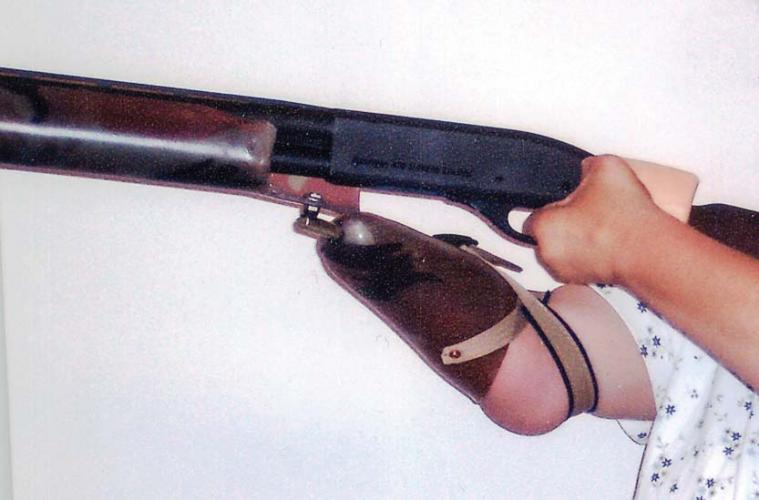


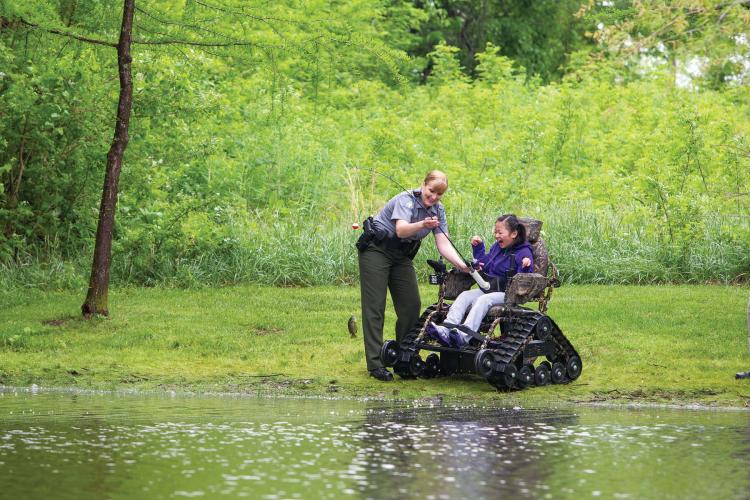

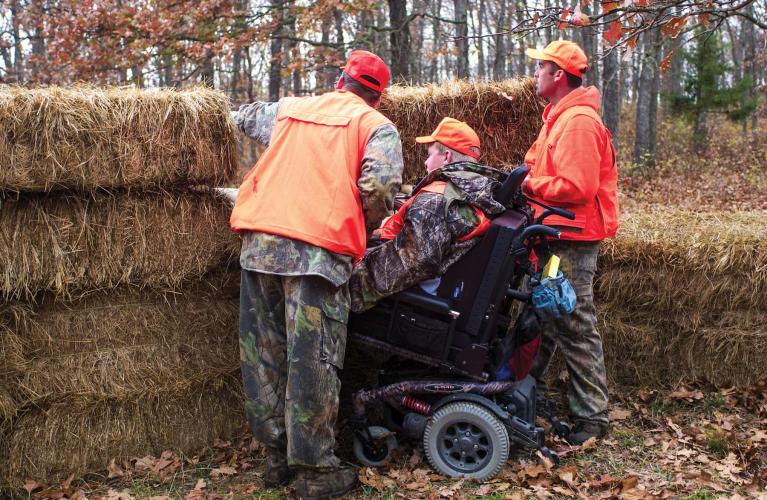
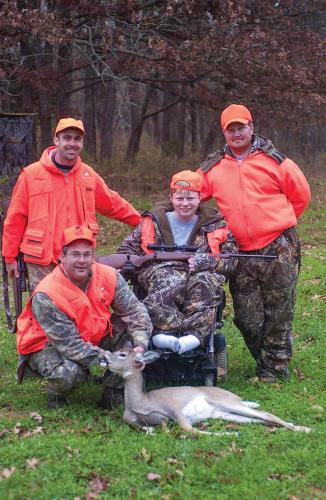




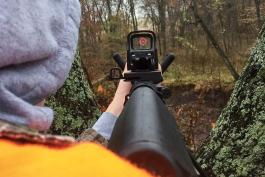
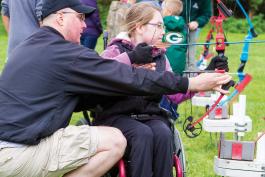



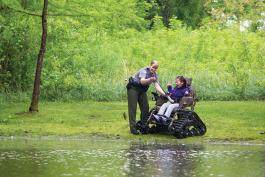


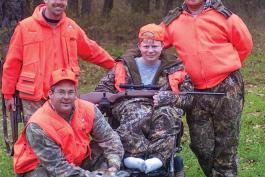

Also In This Issue
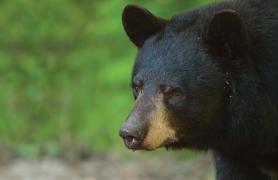

And More...
This Issue's Staff
Art Director - Cliff White
Associate Editor - Bonnie Chasteen
Staff Writer - Heather Feeler
Staff Writer - Kristie Hilgedick
Staff Writer - Joe Jerek
Photographer - Noppadol Paothong
Photographer - David Stonner
Designer - Les Fortenberry
Designer - Marci Porter
Designer - Stephanie Thurber
Circulation - Laura Scheuler






















